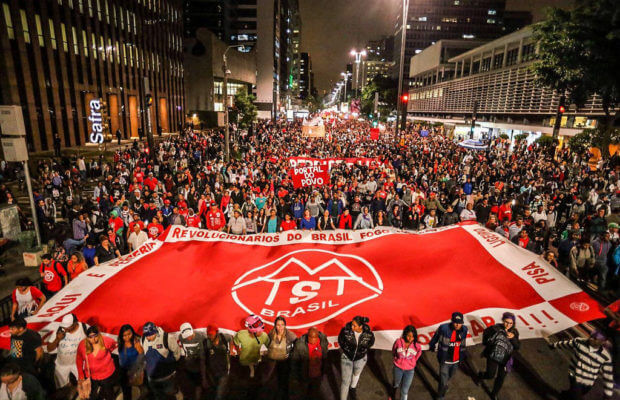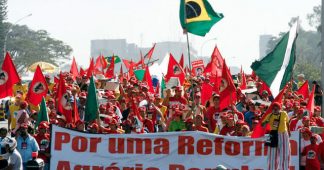Recipients of housing and education programs that suffered cuts talk about how they were crucial to improve their lives
By Juliana Gonçalves
Source: Brasil de Fato/ The Dawn News/ June 18, 2018
Gilvanete Costa is 28 years old and was born in Piauí, northeastern Brazil, who now lives in Luziânia, outside the country’s capital Brasília. Her life changed after social programs started to be established by the Luiz Inácio Lula da Silva administration (2003-2010), and after her mother, rural worker Dejanira Santos Costa, became a recipient of the conditional cash transfer program Bolsa Família in the small town of Manoel Emídio, Piauí. With the money, Dejanira was able to raised Gilvanete and her four brothers, and knowing she could provide food for her children due to the program, she had more opportunity to focus her efforts on their education.
“I remember there were days when she would not buy food just to have money to buy us school supply [before Bolsa Família]. While she didn’t have access to school growing up, Mrs. Dejanira knew that education is a doorway to change people’s social reality,” Gilvanete says.
Years later, in 2013, her mother was one of Gilvanete’s big supporters when she tried to get into college through the Student Financing Fund (FIES). “Back then, it was really, really easy [to get the loan]. I guess it was a different time. It wasn’t like it is now, the political situation was much more under control [then], and our rights were guaranteed. It was an opportunity that I had. I would never be able to afford that [on my own],” she recalls.
Gilvanete graduated in Journalism from the Pontifical Catholic University in Brasília last year with a scholarship program. The journalist believes she is an example showing how necessary social programs are. “These are programs that really promoted more decent conditions to people who don’t have access to the basic needs,” she points out.
Her greatest achievement is the house she bought in 2014 at the Minha Casa Minha Vida projects, one of Brazil’s major federal affordable housing programs. She says it changed her social reality. “Thanks to this program, I was able to make a dream come true and have my own place. Without government incentives, I would never be able to do this,” the journalist says.
Like Gilvanete, many Brazilians had and still have their lives transformed by social programs. But now all these projects mentioned by the journalist are being dismantled by Michel Temer’s coup government.
Housing
The Minha Casa Minha Vida budget, for example, dropped from R$23.5 billion (US$6.2 billion) budget in 2015 to R$8.4 billion (US$2.2 billion). The expected budget in 2017 was as low as R$3.69 billion (US$980 million), and this year investments should drop to R$1.2 billion (US$320 million), a sharp 94.9% cut over 2015 under Temer’s rule. Not only these cuts, but also changes in rules are impacting the access to the program.
The Minha Casa Minha Vida program was implemented in 2009 and since then has entered into contracts for 4 million housing units, with investments larger than R$270 billion (US$72 billion), according to the Ministry of Cities. Over the years, 2.3 million units have been delivered.
In rural Brazil, changes in the rules to access the Minha Casa Minha Vida Rural have resulted in a less effective social program for small farmers.
Sonia Maria da Costa, from another city in Piauí, Francisco Santos, says she slept many nights on the floor before finally getting her house in 2012. Sonia, who is also a member of the coordination of the Small Farmers Movement (Movimento dos Pequenos Agricultores – MPA), argues that the new rules established after the 2016 coup are making it harder for families to access the program.
She explains that, before the new rules were implemented, land owners could donate the property to family members down to the third generation, who in turn could become recipients of the program. “Now if you don’t own land, you cannot access the program,” Sonia says.
Higher education
The changes in social programs made by the coup government also impacted Brazil’s University for All Program (Programa Universidade para Todos – PROUNI), first launched in 2004 by the Lula administration. In Brazil, public higher education is prestigious and free of tuition fees, but also extremely hard to get into, and historically only the elite and upper middle class have been able to dedicate the time and money necessary to get ready for the universities’ stiff admission tests. After the PROUNI was implemented, lower class children were able to massively go to college for the first time.
Eduardo Mauro de Carvalho is a psychologist and former beneficiary of a PROUNI partial scholarship who graduated from a private college in 2010, after four years trying to get into a public university. He scored 97% in the National High School Exam (Exame Nacional do Ensino Médio – ENEM) and was able to pay a reduced tuition fee he could afford.
He now works in the public health care system and says the PROUNI had a positive impact in his education. “Thanks to the PROUNI I had the opportunity to access higher education and improve myself,” he says.
More recently, in 2015, Deborah Monteiro passed the admission exam and got into the Language and Literature School of the Pontifical Catholic University of São Paulo. “The PROUNI helped a lot of people like me, who would not have the means to get into and access university, and actually be able to afford to continue in school. People wouldn’t even try [to take admission tests in the past]. There was this idea that it was not something for us, who live on the outskirts,” she says.
While public higher education in Brazil is coveted by upper classes, the public elementary, middle, and high school system is usually accessed only by those who cannot afford to send their children to private school. Deborah was one of those lower-class black kids from the outskirts and applied for the PROUNI but didn’t really believe in the possibility of getting into college with a 100% scholarship. Now a public school teacher, she was the first person in her family to graduate from college, thanks to the program. Deborah says the PROUNI is the result of the struggles of the working class, and she is sorry that it is being dismantled.
In 2015, the number of full scholarships for low-income students who earn up to 1.5 minimum wage dropped, while the number of partial scholarships increased for students earning up to 3 minimum wages.
Since the PROUNI was created through the second semester of 2016, more than 1.9 million students received some kind of benefit – 70% of those were full-tuition scholarships. In 2016, the Temer administration cut 80,000 PROUNI full-tuition scholarships to reduce public spending.
The number of students dropping out of college increased after these cuts and the country’s financial crisis. According to a survey by the Brazilian Institute of Geography and Statistics (Instituto Brasileiro de Geografia e Estatística – IBGE), more than 170,000 19-to-25-year-old Brazilians dropped out of college in 2017.
Between 2013 and 2016, the average of students dropping out was 5% a year. In 2017, that figure went up to 7.38%. This could be the result of the rise in unemployment and reduced student loans, as there were also cuts in the FIES. After Dilma Rousseff was ousted and Michel Temer was sworn in as president, new cuts impacted the program in the second semester of 2016 and in 2017.
The Temer administration does not seem to be really sure of the reasons or criteria adopted to cut investments. In February 2017, Mendonça Filho, then minister of Education, announced a 29% cut in FIES investments, but the government backed down in 2018 after pressure by the private education sector.
Edition: Diego Sartorato | Translated by Aline Scátola
Published at http://www.thedawn-news.org/2018/06/19/brazil-social-programs-suffer-cuts-up-to-94-9-under-temer/











